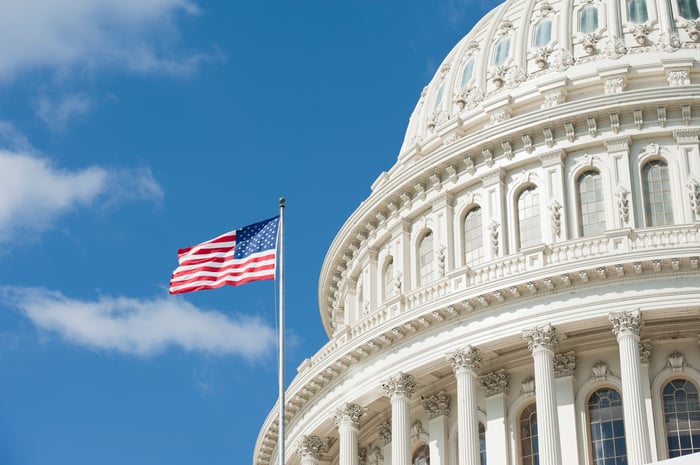For much of 2024, Americans from across our great nation have been focused on Election Day. Although not every aspect of the legislative process has a bearing on Wall Street, the officials who are elected, and the party ultimately in charge, help to shape the fiscal policy that affects the U.S. economy and the businesses that make it tick.
While most of the focus has been placed on which candidate will win the race for the Oval Office -- as of this writing on Nov. 6 at 2:05 a.m., ET, former President Donald Trump has a greater than 95% chance of victory, per the Associated Press (AP) -- the makeup of Congress often proves far more important. This is because votes in the House of Representatives and Senate are needed to pass bills.
In the early morning hours, AP made the call that Republicans would control the Senate, beginning Jan. 3, 2025 -- and that's generally good news for Wall Street, based on what history tells us.

Image source: Getty Images.
The GOP grabs control of the upper house of Congress
Although the final tally could still be hours or days away, what we know right now is that Republicans hold at least 51 seats in the 100-seat Senate, with seven races yet to be called. This marks the first time in four years that the GOP will control the upper house.
At the moment, it's too early to speculate what a Senate win for the Republicans might mean in terms of fiscal policy. If the GOP wins the House and the presidency, a unified government may make it easier to pass certain legislation. But if Congress ends up divided, with Democrats in control of the House of Representatives, we could be looking at more political gridlock.
Perhaps the closest thing to certainty for Wall Street and businesses is that corporate tax rates are unlikely to increase anytime soon from a historically low 21%. Democratic Party presidential nominee Kamala Harris had campaigned on the idea of increasing the corporate tax rate by 33%, from 21% to 28%, to raise additional revenue and lower the federal deficit. A Republican-controlled Senate effectively takes tax hikes for businesses off the table.
A historically low corporate tax rate has played a key role in enticing Wall Street's biggest businesses to conduct substantive share buybacks. The companies that comprise the S&P 500 (^GSPC 0.53%) spent nearly $236 billion on share repurchases in the June-ended quarter, and have tallied more than $7 trillion in buybacks over the trailing-10-year period, according to S&P Global.
AAPL Stock Buybacks (Quarterly) data by YCharts.
For businesses with steady or growing net income, buybacks have the potential to lift earnings per share (EPS). Tech giant Apple (AAPL -0.08%) has put north of $700 billion to work via share repurchases since 2013 and meaningfully improved its EPS, with Alphabet (GOOGL -0.20%) (GOOG -0.23%), the parent company of search engine Google, spending over $271 billon on buybacks over the trailing-10-year period, ended June 30, 2024.
With no concern of higher taxation in the immediate future, look for businesses to harness the GOP's retaking control of the Senate as a catalyst to increase buybacks.

Image source: Getty Images.
Here's what happens to stocks when Republicans control the Senate
Fiscal policy speculation aside, what investors are probably most interested in knowing is what to expect from stocks with Republicans in control of the Senate. Based on 75 years of historic data analyzed by Integrity Wealth Management president and Forbes contributor Mike Patton, there's plenty of reason for investors to smile.
According to Patton's findings, Republican control of the Senate between 1946 and 2020 resulted in an average annual return for the iconic Dow Jones Industrial Average (^DJI 0.92%) of 11.3%. For the sake of comparison, the average annual return for the Dow when Democrats hold a majority in the Senate was "only" 6.3% over this 75-year stretch.
However -- and this is a pretty big "however" -- there's more to this data than meets the eye. Regardless of how you shuffle the puzzle pieces, with regard to party control in the House, Senate, or White House, the average annual return for the Dow Jones Industrial Average has been decisively positive from 1946 through 2020.
Patience, not politics, is the deciding factor that continually rewards the investing community.
It's official. A new bull market is confirmed.
-- Bespoke (@bespokeinvest) June 8, 2023
The S&P 500 is now up 20% from its 10/12/22 closing low. The prior bear market saw the index fall 25.4% over 282 days.
Read more at https://t.co/H4p1RcpfIn. pic.twitter.com/tnRz1wdonp
For example, in June 2023, the researchers at Bespoke Investment Group released the data set you above on X, the social media platform formerly known as Twitter, which examined the calendar-day length of every bear and bull market in the S&P 500 dating back to the start of the Great Depression in September 1929. What Bespoke found was that the average S&P 500 bear market endured just 286 calendar days, or about 9.5 months.
On the other end of the spectrum, the typical S&P 500 bull market has lasted approximately 3.5 times as long, or 1,011 calendar days. What's more, 14 of the 27 bull markets, including the present bull market, have stuck around for a longer period than the lengthiest bear market.
When America's most-influential businesses are simply given time to perform, they deliver, regardless of which political party is in charge.






